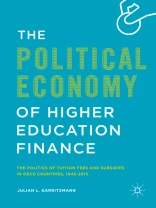This book analyzes the political economy of higher education finance across a range of OECD countries, exploring why some students pay extortionate tuition fees whilst for others their education is free. What are the redistributional consequences of these different tuition-subsidy systems? Analysing the variety of existing systems, Garritzmann shows that across the advanced democracies “Four Worlds of Student Finance” exist. Historically, however, all countries’ higher education systems looked very much alike in the 1940s. The book develops a theoretical model, the Time-Sensitive Partisan Theory, to explain why countries have evolved from a similar historical starting point to today’s very distinct Four Worlds. The empirical analyses combine a wide variety of qualitative and quantitative evidence, studying higher education policies in all advanced democracies from 1945-2015.
Tabla de materias
Chapter 1. The Politics of Higher Education Tuition Fees and Subsidies.- Chapter 2. The Four Worlds of Students Finance – A Comparatives Descriptive Overview of Tuition Fees and Subsidies in 33 OECD-Countries.- Chapter 3 ’
Some Flesh to the Bones’ - Illustrative Case Studies of Four Diverse Cases Over Seven Decades.- Chapter 4. What do Parties Want? – Parties’ Positions and Issue Emphases on Tuition Fees and Subsidies.- Chapter 5. Testing the
Time-Sensitive Partisan Theory in Large-n Analyses: Parties’ Impact on the Tuition-Subsidy Regimes of 21 Democracies over Time.- Chapter 6. Individual-Level Attitudes towards Subsidies – How Positive Feedback Effects Prevent (Radical) Change in the Four Worlds of Student Finance.- Chapter 7. The Political Economy of Higher Education Tuition Fees and Subsidies: Conclusion and Outlook.
Sobre el autor
Julian L. Garritzmann is a Postdoctoral Researcher at the University of Konstanz, Germany. Previously, he was Visiting Fellow at Harvard University. His work has appeared in the
Journal of European Social Policy, the
Journal of European Public Policy, and in
West European Politics. In 2014, he was awarded the JESP/ESPAnet Doctoral Researcher Prize.












